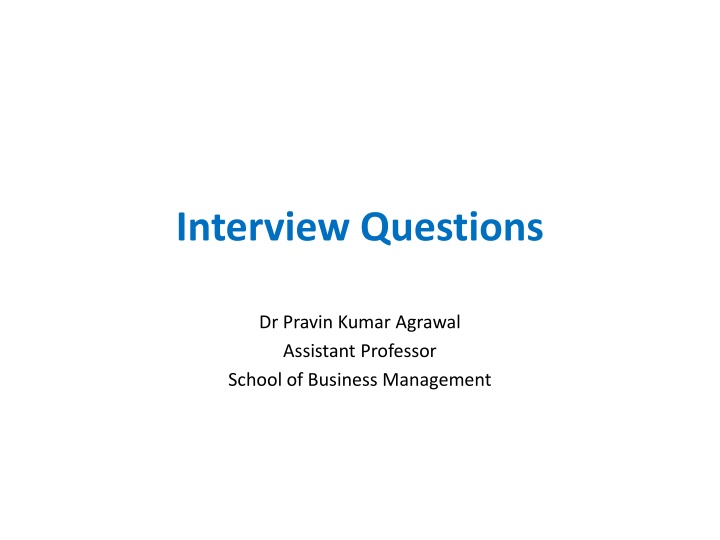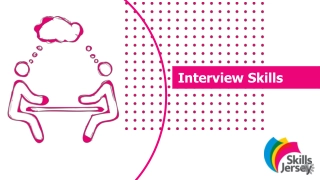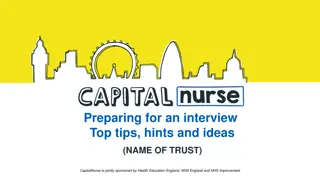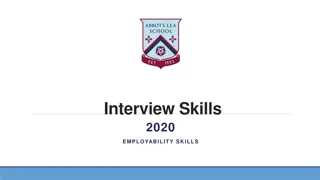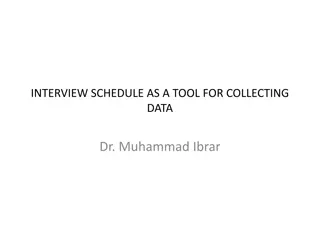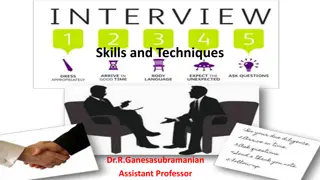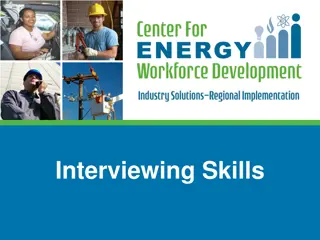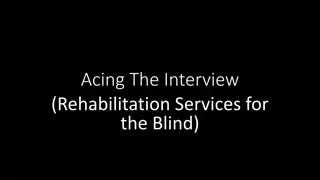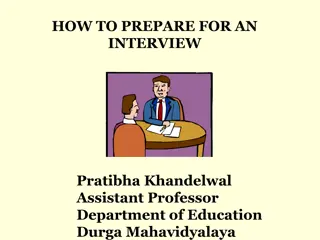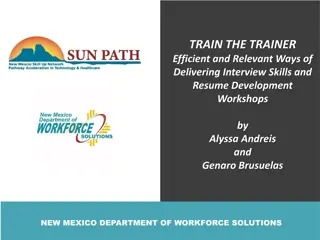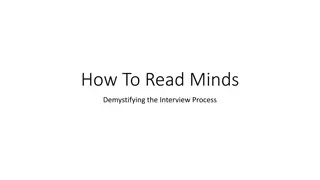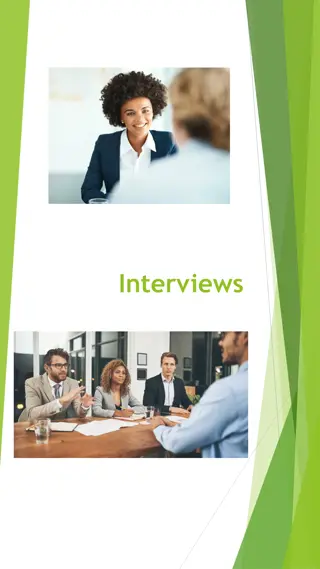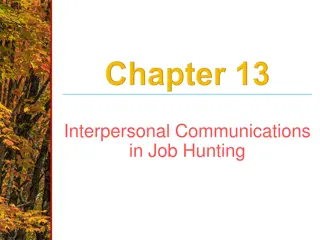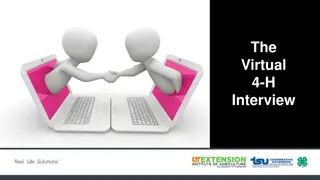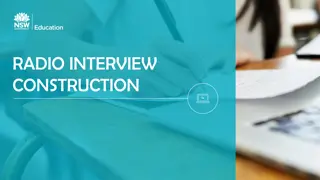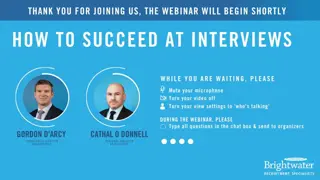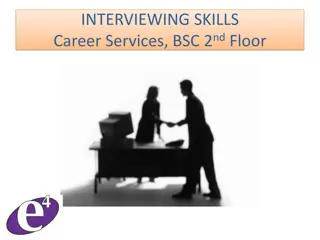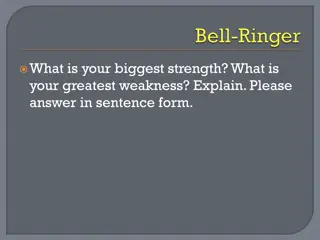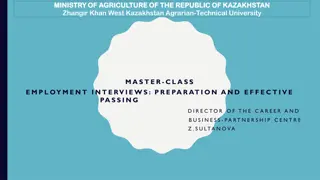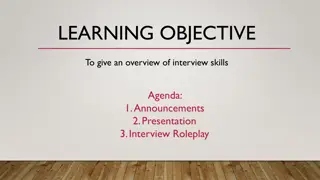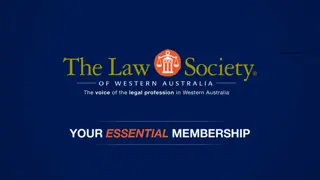Interview Questions
Delve into the process of quantifying Bessel beams using the Nelder-Mead method. Explore the challenges of accounting for background noise, adjusting coefficients for optimal fit, and the potential future applications.
Download Presentation

Please find below an Image/Link to download the presentation.
The content on the website is provided AS IS for your information and personal use only. It may not be sold, licensed, or shared on other websites without obtaining consent from the author.If you encounter any issues during the download, it is possible that the publisher has removed the file from their server.
You are allowed to download the files provided on this website for personal or commercial use, subject to the condition that they are used lawfully. All files are the property of their respective owners.
The content on the website is provided AS IS for your information and personal use only. It may not be sold, licensed, or shared on other websites without obtaining consent from the author.
E N D
Presentation Transcript
Interview Questions Dr Pravin Kumar Agrawal Assistant Professor School of Business Management
Find out what an employer wants most in his or her ideal candidate, then show how you meet those qualifications/requirements.
Do's Know strengths/weaknesses, etc.). Know your potential employer (position you re interviewing for, primary products, services, etc.). Maintain good eye contact during the interview. have a friendly expression when you are greeted by your interviewer. Ask for clarification if you don't understand a question. Treat the interview seriously and as though you are truly interested in the employer and the opportunity presented. Exhibit a positive attitude. Give a firm handshake. Think before you answer. Give concrete examples to support your points. yourself (skills, abilities, goals, interests, values,
Do's Practice answering common interview questions. Rehearse your answers before the interview. Reread your CV just before the interview. Making the best entrance to the interview room . Developing a rapport with the interviewer. Dress professionally. Bring copies of your resume and any other relevant documents. Follow up after the interview.
Don'ts Don't be late Don't badmouth previous employers: Avoid speaking negatively about previous employers or coworkers. This can make you come across as unprofessional. Don't appear uninterested: Show enthusiasm and interest in the job and company. If you appear disinterested, the interviewer may assume you are not a good fit for the role. Don't talk too much: answer questions thoroughly, or going off on tangents. Stay focused on the question and keep your responses concise. Don't forget to ask questions: Come prepared with some questions to ask the interviewer about the company, the position, or the workplace culture. This shows that you are interested and engaged in the conversation.
Don'ts Don't chew gum or smell like smoke. Don't allow your cell phone to sound during the interview. If it does, apologize quickly and ignore it. Don't take a cell phone call. Don't look at a text message. Don't exhibit frustrations or a negative attitude in an interview. Don t apologize. Don t ask obvious or inappropriate questions (about vacation, sick leave, etc.) Don t apply strong perfume. Make nervous movements with your hands. Cross your arms or use body language that could make you seem closed off
1. Tell me about yourself? Start with the present and tell why you are well qualified for the position. Make your answer brief and to the point More about your background, native place Work experience Strength Ambitions Unique Selling Proposition Match your qualifications to what the interviewer is looking for.
2. What are your strengths? Honest, reliable, Discipline and ethical Sense of urgency, if you know that a task is important, then you will work hard to get it done on time. Fast learner, High level of Motivation, Confident Ability to communicate with people. Flexible enough to handle changing environments. Able to cope with setback and learn from my mistakes. Good Listener
3. What are your weaknesses? Mention that you have a flaw, but then also add a suggestion of improving that flaw or demonstrate any actions you are taking to address any weakness. The key to answering questions like this is to show you have learnt from your mistakes and are taking concrete steps to address it.
Answer "I sometimes push my people too hard. I like to work with a sense of urgency and everyone is not always on the same wavelength."
Answer I have been told that I take longer than other colleagues to complete complicated projects or tasks. But this is only because I want to make sure the work I do is to the highest standards. Communication skills are weak I am sometimes accused of being over friendly. Highly Disciplined. I speak too fast.
4. Why did you leave your last job? Never to criticize any previous employers. There was no real room for growing my career. The position you are advertising seems like a excellent match for my knowledge, abilities and qualifications. I am looking for a responsibility. The reason for leaving my last job was that I wanted to spend more time with my family. I am now ready to go back into full time employment. job that has more
5. Why do you want to work for our company? Turn the answer into a compliment to the company you are interviewing for.
Answer There are only a limited number of opportunities for advancement with my current employer. Which is why I'm keen on working for a larger corporation like yours where I believe there are more possibilities to show what I'm capable of. A common way to reply to this is to research the company before hand, find something unique about them and then give that as your answer. Give examples of positive things you have heard about them and say you want to be associated with a reputable brand
Answer You believe their work environment is more fun, energetic and rewarding. Opportunity to work for a market leader After researching your company I have discovered that it is a industry leader and has a excellent reputation. I was also greatly impressed by your companies mission statement, values and culture. I feel strongly that yours is a organization that I would like to work for and be associated with. I feel that your vacancy ideally fits my work experience, skills and qualifications. Therefore I will be able to make a significant contribution to your business as well as fulfill my potential.
Answer I believe your company will help me to develop my career in the direction I want it to go.
6.Do you have any questions you would like to ask me? What do you believe are the biggest challenges your company faces in the near future? What do you believe are the coming trends in your industry and how do you feel your company is positioned to take them on. Following on from our conversation today and my belief that I am a suitable candidate for your position. If my application is successful when do you think I would be required to start work?
7. What have your achievements been to date? Provide a response that has something to do with employment, and if feasible, the position you're applying for. Show an example of how you helped a former employer save efficient, or generate more revenue. money, become more
8. Where do you see yourself in say five years time? I aim to have improved my abilities/skills set and to be a leader in my field. This will mean that I can contribute more to my employers and their business.
8. Where do you see yourself in say five years time? Reassure your interviewer that you're looking to make a long-term commitment...that this position entails exactly what you're looking to do and what you do extremely well. As for your future, you believe that if you perform each job at hand with excellence, future opportunities will take care of themselves. Example: "I am definitely interested in making a long-term commitment to my next position. Judging by what you've told me about this position, it's exactly what I'm looking for and what I am very well qualified to do. In terms of my future career path, I'm confident that if I do my work with excellence, opportunities will inevitable open up for me. It's always been that way in my career, and I'm confident I'll have similar opportunities here."
9. What is the biggest mistake you have ever made? I spent much too long in a job that was stable but didn't present me with enough challenges or chances to advance.
10. What do you like about your present job? Communicating and meeting with new people. Working as part of a team.
11. What do you dislike about your present job? Remember not to directly criticize or be negative about the company, managers or supervisors
Answer Sometimes it is difficult for me to get a sense of my own achievement in a big company like my present employer. There advancement with my present employer who are a small company. are very few opportunities for
12. What's your current salary? My present employer pays me well outside of the norm, however I would not like to limit my job prospects by using that salary as a comparison. As a highly valued member of the company, I am paid on the very high end of current market rates.
13. How much is the salary you are expecting? I'm looking for a job and a company to call home. The most important thing to me will be the job itself and the company. If I am the right person for you, I'm sure you'll make a fair offer appropriate to my job responsibilities, experience, and ability to do the job successfully.
14. How long would you stay with our company As long as I am growing professionally, there is no reason for me to make a move.
15. Can you work under pressure? Yes, I usually find it stimulating. However, I believe in planning management to reduce panic deadlines within my area of responsibility. and proper time
16. How do you handle tension? Tension is caused when you let things pile up. It is usually caused by letting other areas of responsibility slip by for a period of time. I find that if you break those overwhelming tasks into little pieces, they aren't so overwhelming anymore. So I suppose, I handle tension by handling the causes of it, by not letting things slip in other areas that can give rise to it.
17. Why should I hire you? I believe I have the qualifications that you need; I am a team player; and I take directions and have the desire to reach success.
18. What can you do for us that no one else can do? Why do you feel you are a better candidate than others? I can bring to this job a determination to see projects through to a proper conclusion. I listen and take directions well. I am analytical and don't jump to conclusions. And finally, I understand we are in business to make a profit, so I also keep an eye on cost and return.
19. What do you think of your last boss? I liked him/her as a person (if applicable), respected him/her professionally and appreciated his/her guidance.
20. Rate yourself on a scale of 1 to 10, 10 being the highest Perhaps an 8 or 9, as I always give my best shot, but in doing so, I always increase my skills and therefore always see room for improvement
21. Can you take instructions - and criticism - without feeling hurt or upset? Yes, I can take instructions - and more importantly, I can take constructive criticism without feeling hurt. Even with the best intent, I will still make mistakes and at times someone will have to put me back on the right track. I know that if I expect to rise in the company, I must first prove myself to be manageable.
22. How would you react if you get to know that your boss is younger than you (or has less years of experience than you) make-or-break cultural fit question. Always answer diplomatically saying that age/years etc are irrelevent for me. What matters for me is what can I learn from someone irrespective of whether that person is junior or senior to me. I can learn a few things from my boss for sure, and if it turns out that I am more experienced or older than my boss, then I am sure I can be a valuable resource for my boss in terms of helping out with critical decision making. My experience will definitely be an asset for my boss in such cases. Throw in examples of successful sports team of any sport which you like, there will be several examples where the captain of a successful sports team is younger than a senior important veteran player of the team. If you can give that type of analogy, your answer will sound more genuine/natural
23. What would you do if you find your senior or boss doing something unethical or violating a company policy ? Always talk about that you would gently point out to that person directly, and request that person to follow the correct process. In case the violations continue, then I would like to know about the violation reporting policy of your company. Here, you can turnaround the interview by cross-questioning your interviewer - "by the way, can you give a brief insight into policy violation reporting mechanism which exists in this company ?"
24. Who has been your ideal/best boss ? Talk about any boss who was a strong decision maker, always stood by the team, and openly praised contributions by team members, and also clearly guided the team members towards career growth You can talk like - "Yes, I have been very fortunate to work under one/two such boss(es) earlier in my career. I learnt a lot from him/her/them. I always found that person to be always supportive of the team, and that person was the only person who actually told me the difference between a Sales Manager and a Senior Sales Manager in clear measurable terms etc."
25. Are not you overqualified for this position The main concern behind the "overqualified" question is that you will leave your new employer as soon as something better comes your way. Anything you can say to demonstrate the sincerity of your commitment to the employer and reassure him that you're looking to stay for the long-term will help you overcome this objection. "Because contribute right away, perhaps much faster than someone who'd have to be brought along more slowly." of my unusually strong experience in,
26. Would you lie for the company? Giving a positive statement which covers all bases instead. Example: "I would never do anything to hurt the company If aggressively pressed to choose between two competing values, always choose personal integrity. It is the most prized of all values.
27. Looking back, what would you do differently in your life? TRAPS: This question is usually asked to uncover any life-influencing mistakes, regrets, disappointments or problems that may continue personality and performance. to affect your You do not want to give the interviewer anything negative to remember you by, such as some great personal or career disappointment, even long ago, that you wish could have been avoided.
Answer Indicate that you are a happy, fulfilled, optimistic person and that, in general, you wouldn't change a thing. Example: "It's been a good life, rich in learning and experience, and the best it yet to come. Every experience in life is a lesson it its own way. I wouldn't change a thing"
28. What makes you Angry? "I am an even-tempered and positive person by nature, and I believe this helps me a great deal in keeping my department running smoothly, harmoniously and with a genuine esprit de corps. I believe in communicating clearly what's expected, getting people's commitment to those goals, and then following up continuously to check progress. If anyone or anything is going off track, I want to know about it early. If, after that kind of open communication and follow up, someone isn't getting the job done, I'll want to know why. If there's no good reason, then I'll get impatient and angry... and take appropriate steps from there. But if you hire good people, motivate them to strive for excellence and then follow up constantly, it almost never gets to that state.
29. What was the toughest decision you ever had to make? Be prepared with a good example, explaining why the decision was difficult... the process you followed in reaching it... the courageous or effective way you carried it out...and the beneficial results.
30. Who has inspired you in your life and why? Have a few heroes in mind, from your mental "Board of Directors - Leaders in your industry, from history or anyone else who has been your mentor. Be prepared to give examples of how their words, actions or teachings have helped inspire your achievements. As always, prepare an answer which highlights qualities that would be highly valuable in the position you are seeking.
31. How do you feel about working nights and weekends? I do have a family who likes to see me after work and on weekends. They add balance and richness to my life, which in turn helps me be happy and productive at work. If I could handle some of the extra work at home in the evenings or on weekends, that would be ideal. You'd be getting a person of exceptional productivity who meets your needs with strong credentials. And I'd be able to handle some of the heavy workload at home where I can be under the same roof as my family.
32. Are you willing to relocate or travel? Answer with a flat no and you may slam the door shut on this opportunity ANSWER: First find out where you may have to relocate and how much travel may be involved. Then respond to the question If there's no problem, say no enthusiastically.
33. I'm concerned that you don't have as much experience as we'd like in... Highlight relevant skills: "While I may not have as much experience as some other candidates, I do have skills and knowledge that I believe could be valuable in this role. For example, I have expertise in [relevant skill or area of knowledge] that could help me contribute to the team. Emphasize your willingness to learn: Another approach is to emphasize your willingness to learn and grow in the role. You might say something like, "Although I don't have as much experience as you would like, I am eager to learn and am confident that I can quickly get up to speed in this position. I am a quick learner and am always looking for opportunities to develop my skills."
